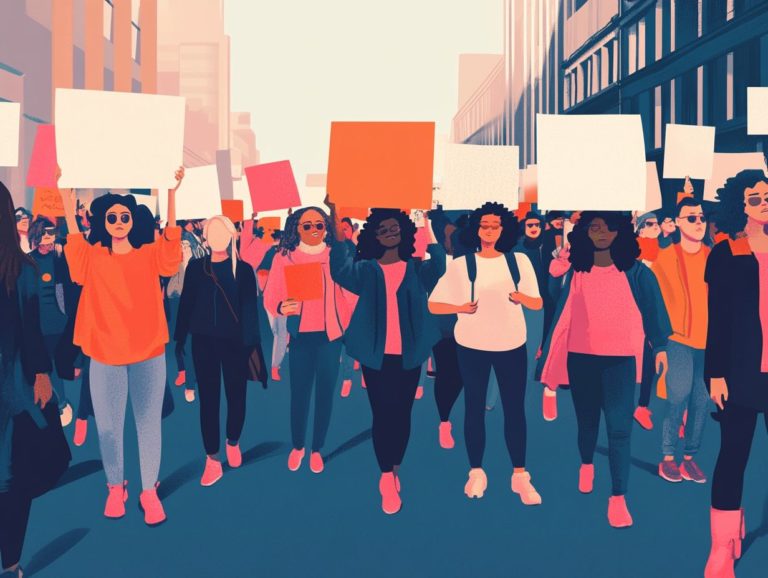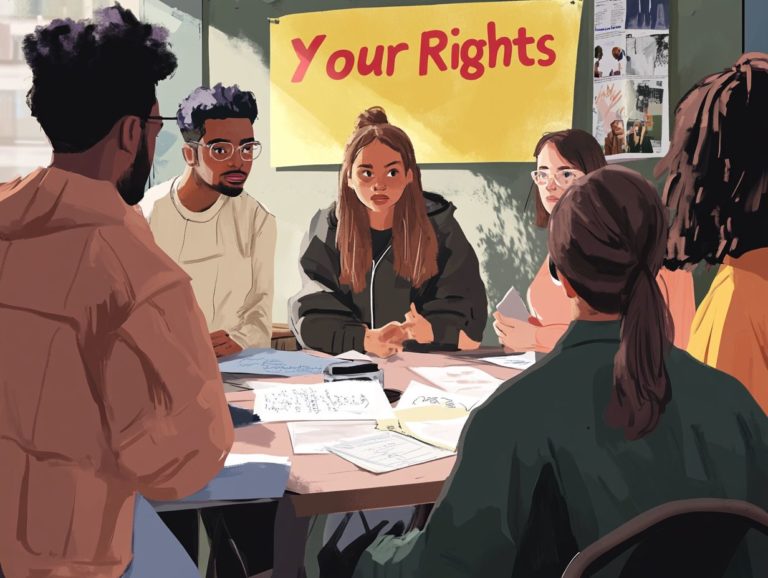Rights of the Accused in Drug Cases
Handling drug cases can feel overwhelming, especially when the stakes are high. This overview provides insight into drug-related charges and the various types of offenses that may arise.
It emphasizes your fundamental rights as the accused, including the presumption of innocence and the right to legal representation. You’ll also encounter common challenges associated with these cases, such as unlawful search and seizure. This guide also offers valuable resources and strategies to protect your rights.
Whether you are directly involved or simply seeking to understand the legal landscape better, this guide is a must-read for anyone facing drug charges!
Contents
- Key Takeaways:
- Overview of Drug Cases and the Accused
- Rights of the Accused in Drug Cases
- Common Challenges Faced by the Accused
- Protecting the Rights of the Accused
- Frequently Asked Questions
- What are the rights of the accused in drug cases?
- Can the accused refuse to answer questions during an arrest for a drug offense?
- Does the accused have the right to an attorney in drug cases?
- What happens if the rights of the accused in drug cases are violated?
- Can the accused be held in jail for a long time before a trial for a drug offense?
- What is the role of the defense attorney in drug cases?
Key Takeaways:
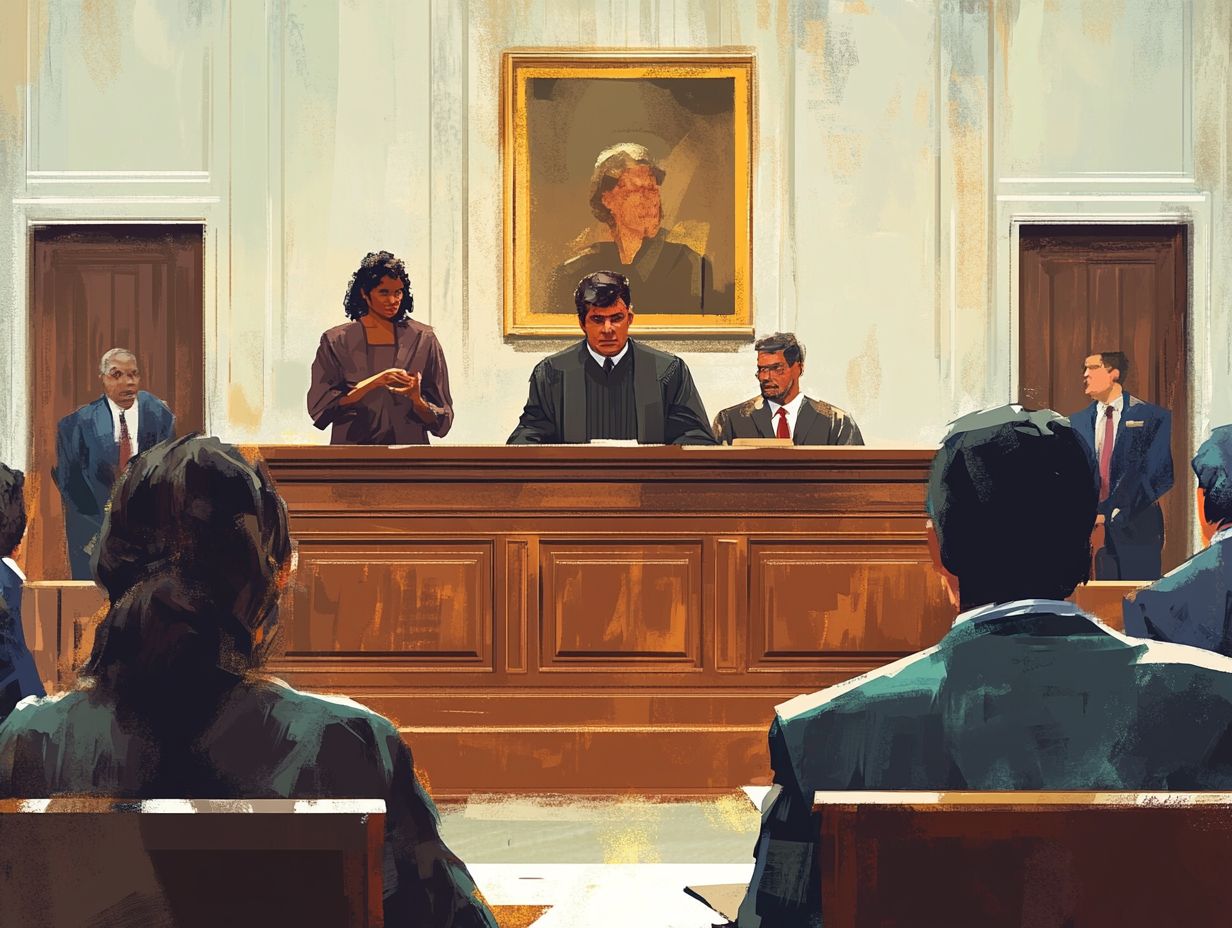
The accused in drug cases are entitled to the presumption of innocence and due process. Access to legal representation is a fundamental right for those facing drug charges. Understanding the rights of the accused in appeals can help navigate common challenges, including unlawful search and seizure and coerced confessions.
Overview of Drug Cases and the Accused
Drug cases are a critical part of the criminal justice system, covering a range of charges related to drug crimes, including possession, trafficking, and distribution.
In cities like Seattle and Renton, the impact of these cases can deeply affect communities, influencing the rights of the accused and their access to legal help.
Understanding the landscape of drug-related offenses is vital as you navigate this complex legal environment. It involves upholding your rights to due process, ensuring the exclusion of evidence obtained unlawfully, and pursuing justice in courts across states like Indianapolis and Washington.
Types of Drug Cases and Charges
Drug cases can vary greatly, from minor charges like drug possession to serious accusations such as drug trafficking. Each type carries its own legal implications and penalties.
These classifications can lead to consequences that affect not just your freedom but also your future employment opportunities and personal relationships.
If you face possession charges, you may qualify for diversion programs or substance abuse treatment. In contrast, if you’re accused of trafficking, you could face lengthy prison sentences and substantial fines.
That s why engaging experienced legal counsel is essential for navigating these complexities. Skilled criminal defense strategies can help mitigate penalties, negotiate plea deals, or even seek case dismissals based on issues like improper search and seizure or insufficient evidence.
Rights of the Accused in Drug Cases
The rights of the accused in drug cases are firmly rooted in various provisions of the U.S. Constitution, particularly the Fifth and Sixth Amendments. These amendments ensure due process, meaning the legal requirement that the state must respect all legal rights owed to a person, and the right to legal counsel, reinforcing the principle of a fair trial. For a deeper understanding, refer to the rights of the accused.
In Washington and beyond, these rights form the basis of legal proceedings, protecting against wrongful punishment and ensuring that you have access to legal assistance while navigating the complex criminal justice system.
Presumption of Innocence and Due Process
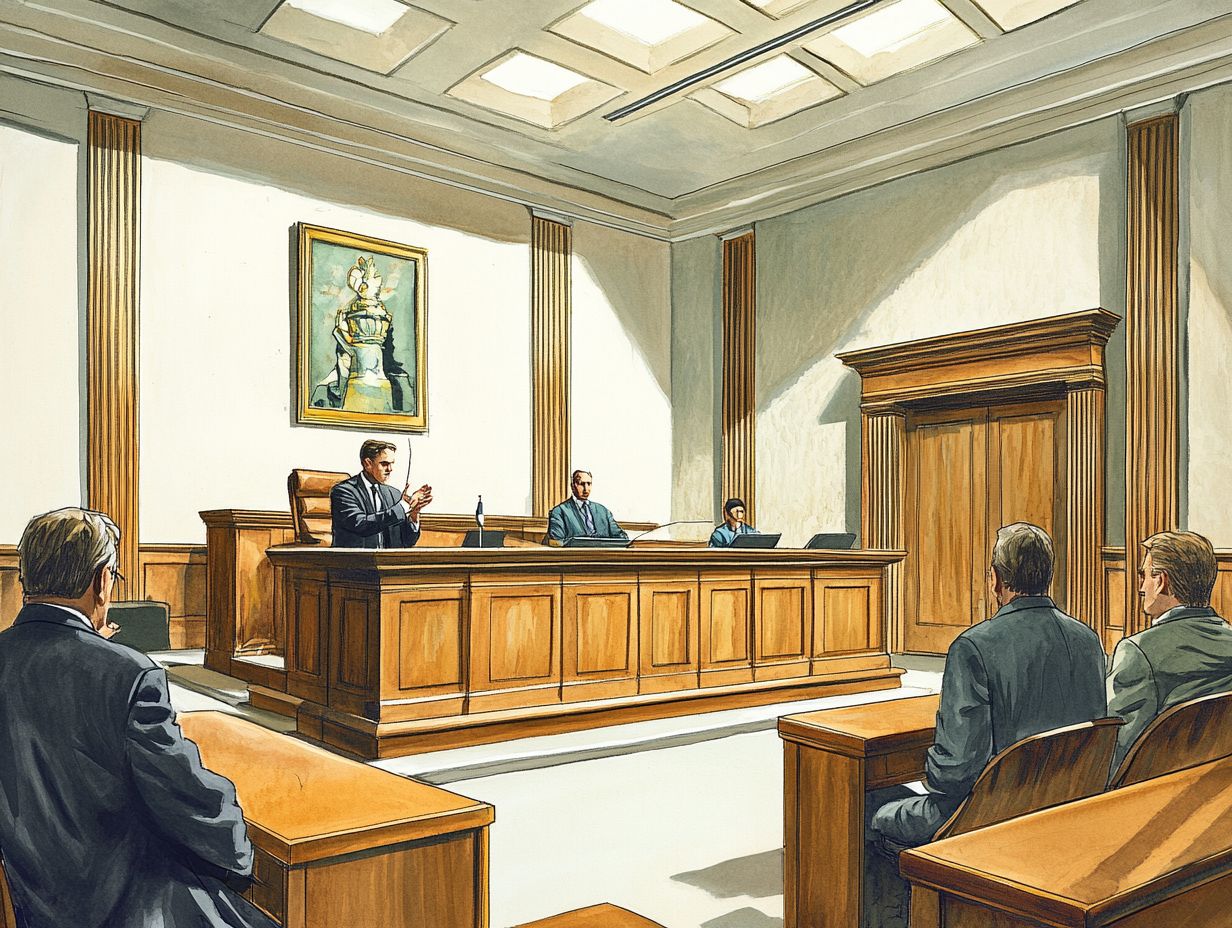
The presumption of innocence is a cornerstone of courtroom proceedings, affirming that you are considered innocent until proven guilty. This principle is pivotal to due process.
This holds particular significance in drug cases, where the stakes can escalate dramatically and the consequences of a conviction can be life-altering.
It places the burden of proof on the prosecution, compelling them to establish guilt beyond a reasonable doubt. This creates a protective shield for you, safeguarding your rights and ensuring that judgments regarding culpability are based on solid evidence rather than mere assumptions or biases.
Upholding this principle is essential for maintaining fairness within the legal system and preserving the integrity of judicial proceedings.
Right to Legal Representation
The right to legal representation is firmly established in the Sixth Amendment and is important for getting a fair trial for individuals facing drug charges.
Having competent legal counsel can profoundly influence the outcome of your trial. Skilled criminal defense attorneys are well-versed in the complexities of drug laws and courtroom procedures. They navigate the legal landscape effectively.
These professionals excel at scrutinizing evidence, negotiating plea deals agreements between the defendant and prosecution to resolve a case without going to trial and crafting tailored defense strategies for your unique circumstances.
Legal aid organizations offer important support and resources to those who cannot afford private counsel. This ensures that every defendant, regardless of financial means, has access to quality representation.
This help can dramatically reduce sentences and improve life outcomes, ultimately shaping life trajectories for the better.
Right to a Fair Trial
The right to a fair trial stands as a fundamental pillar of the American legal system. It ensures that you, as a defendant, have the opportunity to present your case before an impartial jury within the courtroom.
This process is intricately tied to juror selection. The essence of a just trial relies on the diverse perspectives and experiences each juror brings, remaining unbiased to deliver a true verdict.
In the courtroom, both the prosecution and defense play critical roles, operating under rules designed to protect your rights, especially in complex cases like drug offenses.
You are entitled to legal representation, the opportunity to confront witnesses, and access to all evidence against you. These are essential elements that foster a transparent and equitable judicial process.
The interplay of these factors upholds the principles of justice and reinforces society s belief in fair treatment under the law.
Common Challenges Faced by the Accused
Individuals accused in drug cases often encounter substantial challenges that can profoundly impact their defense.
These challenges may include concerns surrounding unlawful searches, the admissibility of evidence, and the potential for rights violations during interactions with law enforcement.
Unlawful Search and Seizure
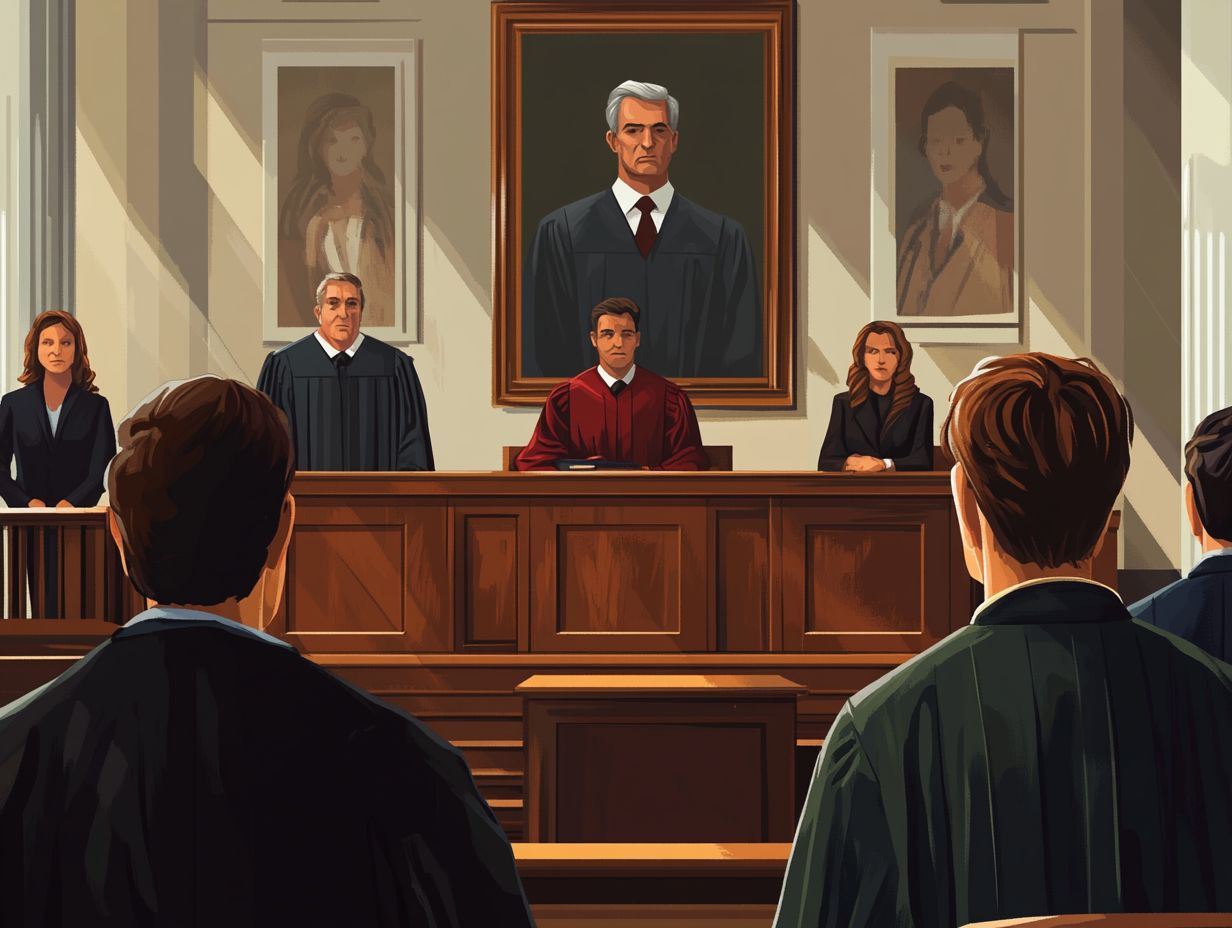
Unlawful search and seizure, as outlined by the Fourth Amendment, poses a serious threat to your rights if you find yourself accused of a crime. If police gather evidence through unreasonable searches, it may be thrown out in court.
This constitutional protection isn t just a shield against intrusive government actions. It s also essential for maintaining the integrity of the judicial process. If you re facing drug charges, this principle becomes a crucial tool for challenging the legality of the evidence against you.
Should police conduct a search without probable cause or a valid warrant, any evidence collected might be tossed out, significantly weakening the prosecution’s case.
Therefore, it s vital for individuals involved in drug-related offenses to fully understand their rights. Asserting these rights can lead to a fairer outcome and might even result in case dismissal or reduced charges.
Coerced Confessions
Coerced confessions pose a significant challenge in drug cases. Violations of rights can lead to unreliable testimony that undermines the integrity of the judicial process. Such confessions often occur under immense pressure, causing individuals to unknowingly admit guilt, thinking it s their only way out of a dire situation.
This raises serious concerns about the protection of defendants’ rights, particularly in high-stakes environments. The invocation of Miranda Rights, which inform you of your right to remain silent, becomes essential. It ensures that you are aware of your right to seek legal counsel before answering any questions.
Without proper representation, you risk becoming vulnerable to manipulative tactics. This complicates the legal landscape and jeopardizes the pursuit of justice in drug-related cases.
Protecting the Rights of the Accused
Protecting the rights of the accused in drug cases requires a meticulous blend of legal strategies and exemplary representation from criminal defense attorneys, as outlined in the rights of the accused: key takeaways.
This ensures that you, as a defendant, receive a fair trial while your rights are upheld throughout every facet of the courtroom proceedings.
Legal Strategies and Resources
Legal strategies for defendants in drug cases include plea agreements, motions to suppress evidence, and leveraging expert testimony to strengthen their defense.
It s crucial for defendants to work closely with experienced legal counsel who can navigate the intricacies of the legal system. Open communication fosters the development of customized strategies that align with your unique circumstances, paving the way for alternative defenses like those based on illegal search and seizure or entrapment.
Use available resources like drug treatment programs and educational workshops to bolster your case and showcase your commitment to reform. These proactive steps can significantly impact the proceedings while ensuring your rights are protected.
Frequently Asked Questions
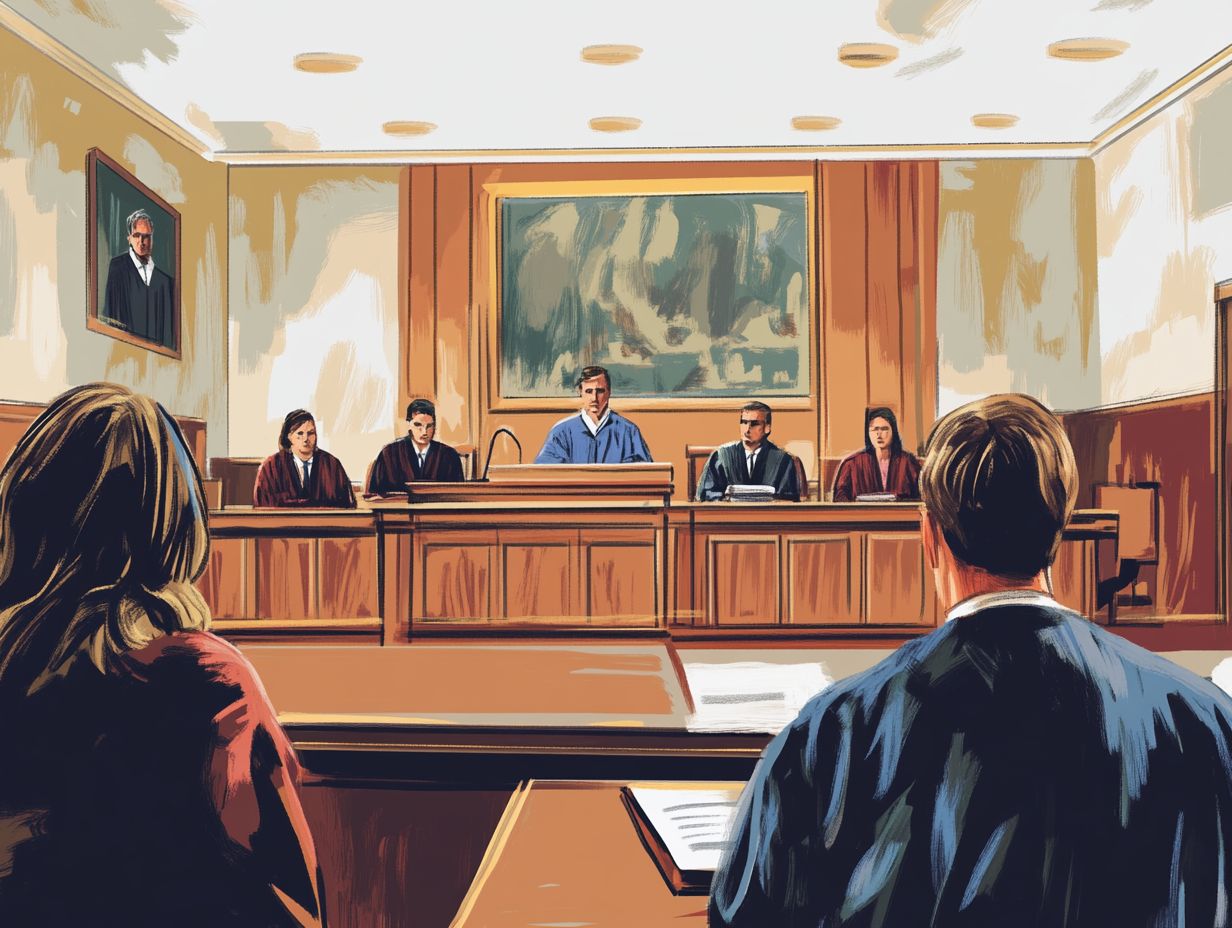
What are the rights of the accused in drug cases?
Accused individuals have important rights in drug cases, including the right to remain silent, the right to an attorney, and the right to a fair trial. For a comprehensive understanding, you can learn more about the rights of the accused, which also include the presumption of innocence until proven guilty, the right to confront witnesses, and the right to a speedy trial.
Can the accused refuse to answer questions during an arrest for a drug offense?
Yes, the accused has the right to remain silent and does not have to answer any questions during an arrest for a drug offense. This right is protected by the Fifth Amendment of the United States Constitution.
Does the accused have the right to an attorney in drug cases?
Yes, the accused has the right to an attorney in drug cases. If they cannot afford one, the court will provide an attorney for them.
What happens if the rights of the accused in drug cases are violated?
If the rights of the accused in drug cases are violated, it can result in the case being dismissed or evidence being thrown out. Understanding these rights of the accused is crucial, as evidence obtained illegally can’t be used against you, which may lead to a dismissal of your case.
Can the accused be held in jail for a long time before a trial for a drug offense?
No, the accused has the right to a speedy trial. This means they cannot be held in jail for an excessive amount of time before their trial. If the trial is not held within a reasonable time, the accused can request to be released from jail.
What is the role of the defense attorney in drug cases?
The defense attorney’s role in drug cases is to protect the rights of the accused and ensure a fair trial. They will question the prosecution’s evidence and witnesses and present a defense for the accused. Their goal is to prove the accused’s innocence or to minimize their punishment if found guilty.

